Accounting Theory Report: Paradise Plantations LTD and Sustainability
VerifiedAdded on 2023/02/01
|10
|2839
|88
Report
AI Summary
This report provides a comprehensive analysis of accounting theory, focusing on the tea industry and the company Paradise Plantations LTD. It begins with an introduction to external factors affecting management activities, utilizing PESTLE analysis. The report identifies environmental and social issues in the tea industry, such as climate dependency, labor practices, and deforestation, and explores how Paradise Plantations LTD addresses these issues through strategies like sustainable certifications and training programs. The impact of socio-political and economic issues on company management is examined, including the importance of fulfilling labor needs and the effects of tea production on the national economy. The report delves into stakeholder theory, differentiating between ethical and managerial branches and emphasizing the importance of sustainability reporting. It also explores gaining legitimacy through the six-capital model and the factors driving the company to embed sustainability measures using isomorphic processes of Institutional theory. The study concludes with a review of the company's sustainability-driven strategies and their relevance to business development, providing a detailed overview of how accounting principles can be applied to real-world business challenges in the tea industry.
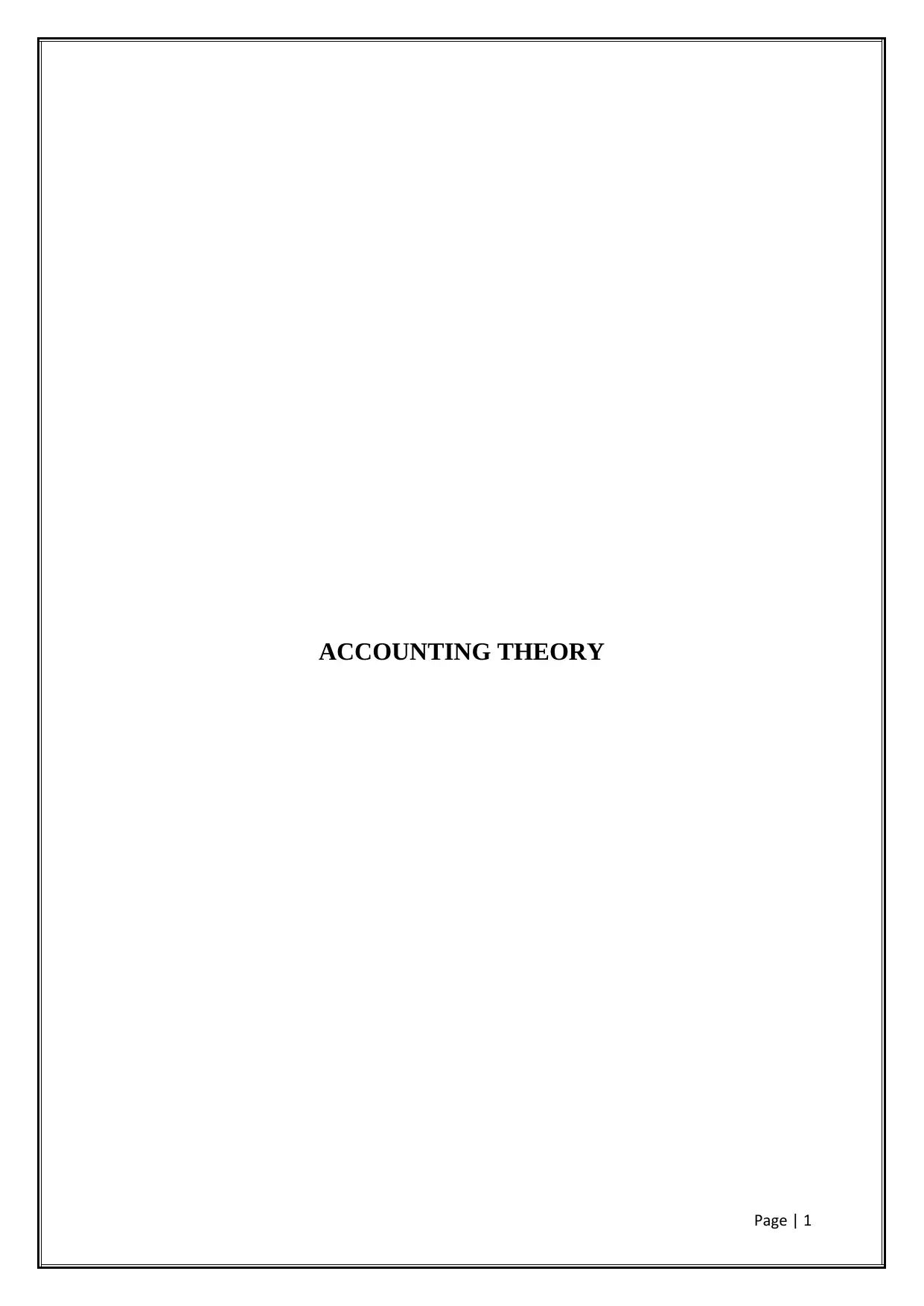
ACCOUNTING THEORY
Page | 1
Page | 1
Paraphrase This Document
Need a fresh take? Get an instant paraphrase of this document with our AI Paraphraser
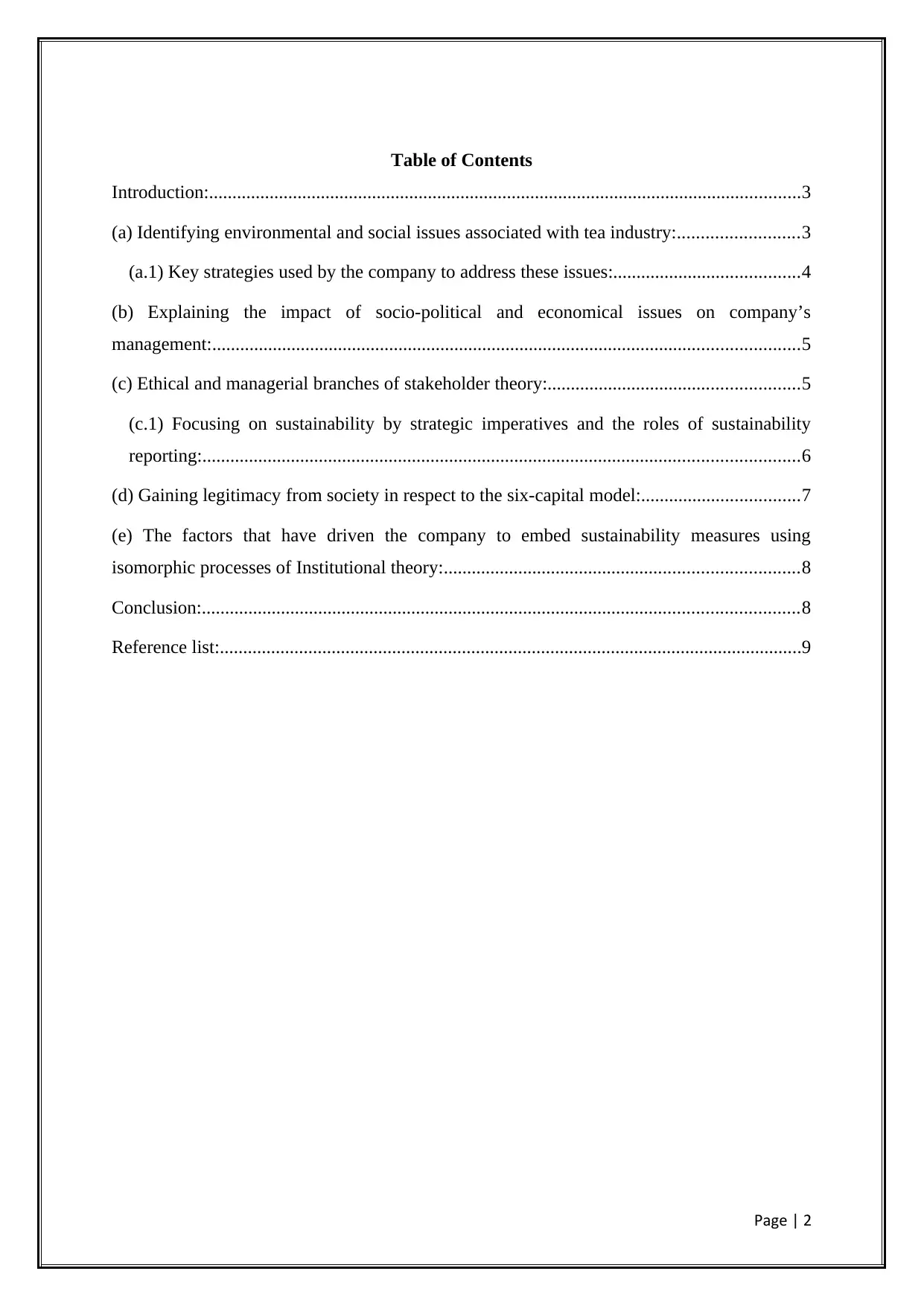
Table of Contents
Introduction:...............................................................................................................................3
(a) Identifying environmental and social issues associated with tea industry:..........................3
(a.1) Key strategies used by the company to address these issues:........................................4
(b) Explaining the impact of socio-political and economical issues on company’s
management:..............................................................................................................................5
(c) Ethical and managerial branches of stakeholder theory:......................................................5
(c.1) Focusing on sustainability by strategic imperatives and the roles of sustainability
reporting:................................................................................................................................6
(d) Gaining legitimacy from society in respect to the six-capital model:..................................7
(e) The factors that have driven the company to embed sustainability measures using
isomorphic processes of Institutional theory:............................................................................8
Conclusion:................................................................................................................................8
Reference list:.............................................................................................................................9
Page | 2
Introduction:...............................................................................................................................3
(a) Identifying environmental and social issues associated with tea industry:..........................3
(a.1) Key strategies used by the company to address these issues:........................................4
(b) Explaining the impact of socio-political and economical issues on company’s
management:..............................................................................................................................5
(c) Ethical and managerial branches of stakeholder theory:......................................................5
(c.1) Focusing on sustainability by strategic imperatives and the roles of sustainability
reporting:................................................................................................................................6
(d) Gaining legitimacy from society in respect to the six-capital model:..................................7
(e) The factors that have driven the company to embed sustainability measures using
isomorphic processes of Institutional theory:............................................................................8
Conclusion:................................................................................................................................8
Reference list:.............................................................................................................................9
Page | 2
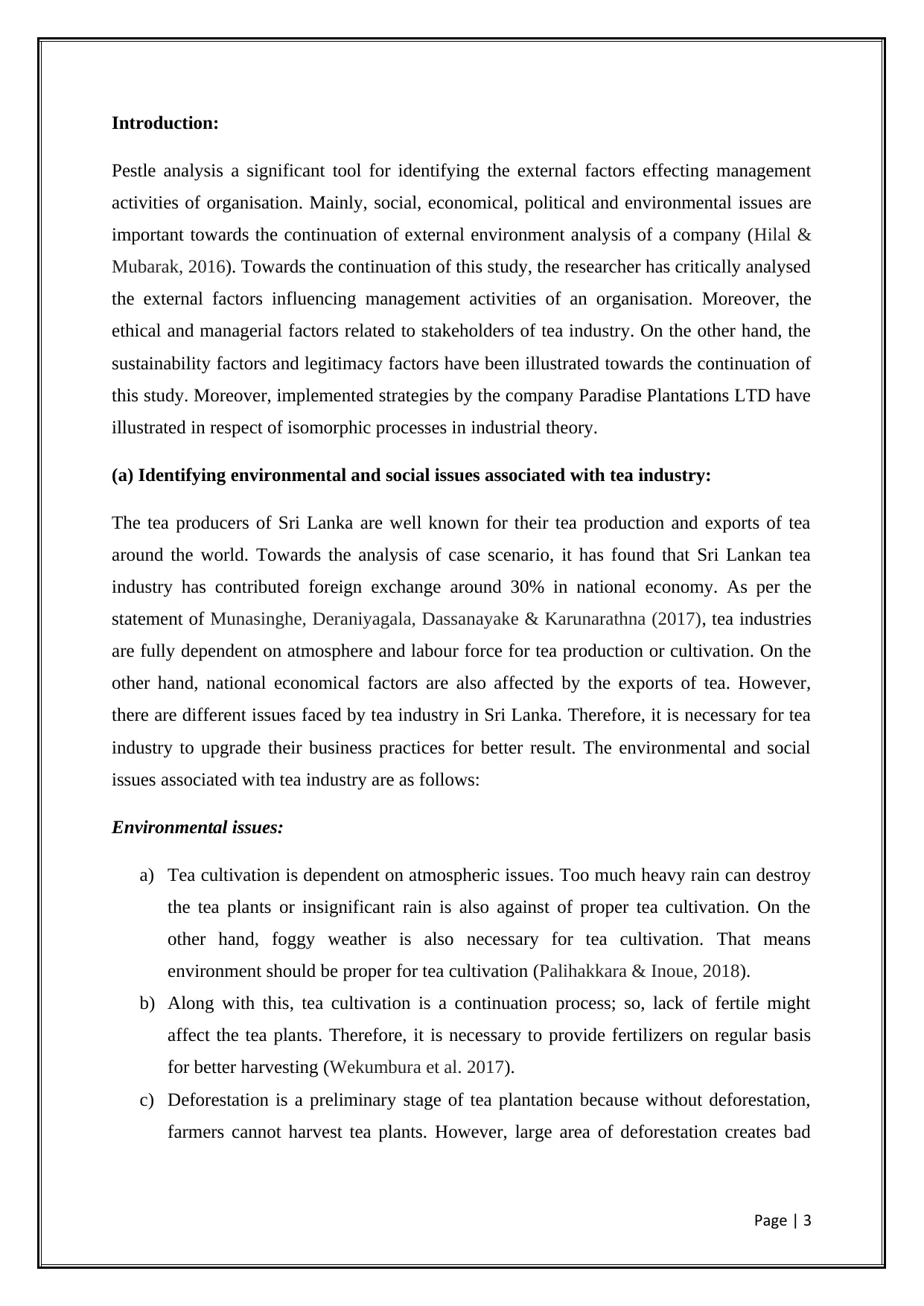
Introduction:
Pestle analysis a significant tool for identifying the external factors effecting management
activities of organisation. Mainly, social, economical, political and environmental issues are
important towards the continuation of external environment analysis of a company (Hilal &
Mubarak, 2016). Towards the continuation of this study, the researcher has critically analysed
the external factors influencing management activities of an organisation. Moreover, the
ethical and managerial factors related to stakeholders of tea industry. On the other hand, the
sustainability factors and legitimacy factors have been illustrated towards the continuation of
this study. Moreover, implemented strategies by the company Paradise Plantations LTD have
illustrated in respect of isomorphic processes in industrial theory.
(a) Identifying environmental and social issues associated with tea industry:
The tea producers of Sri Lanka are well known for their tea production and exports of tea
around the world. Towards the analysis of case scenario, it has found that Sri Lankan tea
industry has contributed foreign exchange around 30% in national economy. As per the
statement of Munasinghe, Deraniyagala, Dassanayake & Karunarathna (2017), tea industries
are fully dependent on atmosphere and labour force for tea production or cultivation. On the
other hand, national economical factors are also affected by the exports of tea. However,
there are different issues faced by tea industry in Sri Lanka. Therefore, it is necessary for tea
industry to upgrade their business practices for better result. The environmental and social
issues associated with tea industry are as follows:
Environmental issues:
a) Tea cultivation is dependent on atmospheric issues. Too much heavy rain can destroy
the tea plants or insignificant rain is also against of proper tea cultivation. On the
other hand, foggy weather is also necessary for tea cultivation. That means
environment should be proper for tea cultivation (Palihakkara & Inoue, 2018).
b) Along with this, tea cultivation is a continuation process; so, lack of fertile might
affect the tea plants. Therefore, it is necessary to provide fertilizers on regular basis
for better harvesting (Wekumbura et al. 2017).
c) Deforestation is a preliminary stage of tea plantation because without deforestation,
farmers cannot harvest tea plants. However, large area of deforestation creates bad
Page | 3
Pestle analysis a significant tool for identifying the external factors effecting management
activities of organisation. Mainly, social, economical, political and environmental issues are
important towards the continuation of external environment analysis of a company (Hilal &
Mubarak, 2016). Towards the continuation of this study, the researcher has critically analysed
the external factors influencing management activities of an organisation. Moreover, the
ethical and managerial factors related to stakeholders of tea industry. On the other hand, the
sustainability factors and legitimacy factors have been illustrated towards the continuation of
this study. Moreover, implemented strategies by the company Paradise Plantations LTD have
illustrated in respect of isomorphic processes in industrial theory.
(a) Identifying environmental and social issues associated with tea industry:
The tea producers of Sri Lanka are well known for their tea production and exports of tea
around the world. Towards the analysis of case scenario, it has found that Sri Lankan tea
industry has contributed foreign exchange around 30% in national economy. As per the
statement of Munasinghe, Deraniyagala, Dassanayake & Karunarathna (2017), tea industries
are fully dependent on atmosphere and labour force for tea production or cultivation. On the
other hand, national economical factors are also affected by the exports of tea. However,
there are different issues faced by tea industry in Sri Lanka. Therefore, it is necessary for tea
industry to upgrade their business practices for better result. The environmental and social
issues associated with tea industry are as follows:
Environmental issues:
a) Tea cultivation is dependent on atmospheric issues. Too much heavy rain can destroy
the tea plants or insignificant rain is also against of proper tea cultivation. On the
other hand, foggy weather is also necessary for tea cultivation. That means
environment should be proper for tea cultivation (Palihakkara & Inoue, 2018).
b) Along with this, tea cultivation is a continuation process; so, lack of fertile might
affect the tea plants. Therefore, it is necessary to provide fertilizers on regular basis
for better harvesting (Wekumbura et al. 2017).
c) Deforestation is a preliminary stage of tea plantation because without deforestation,
farmers cannot harvest tea plants. However, large area of deforestation creates bad
Page | 3
⊘ This is a preview!⊘
Do you want full access?
Subscribe today to unlock all pages.

Trusted by 1+ million students worldwide
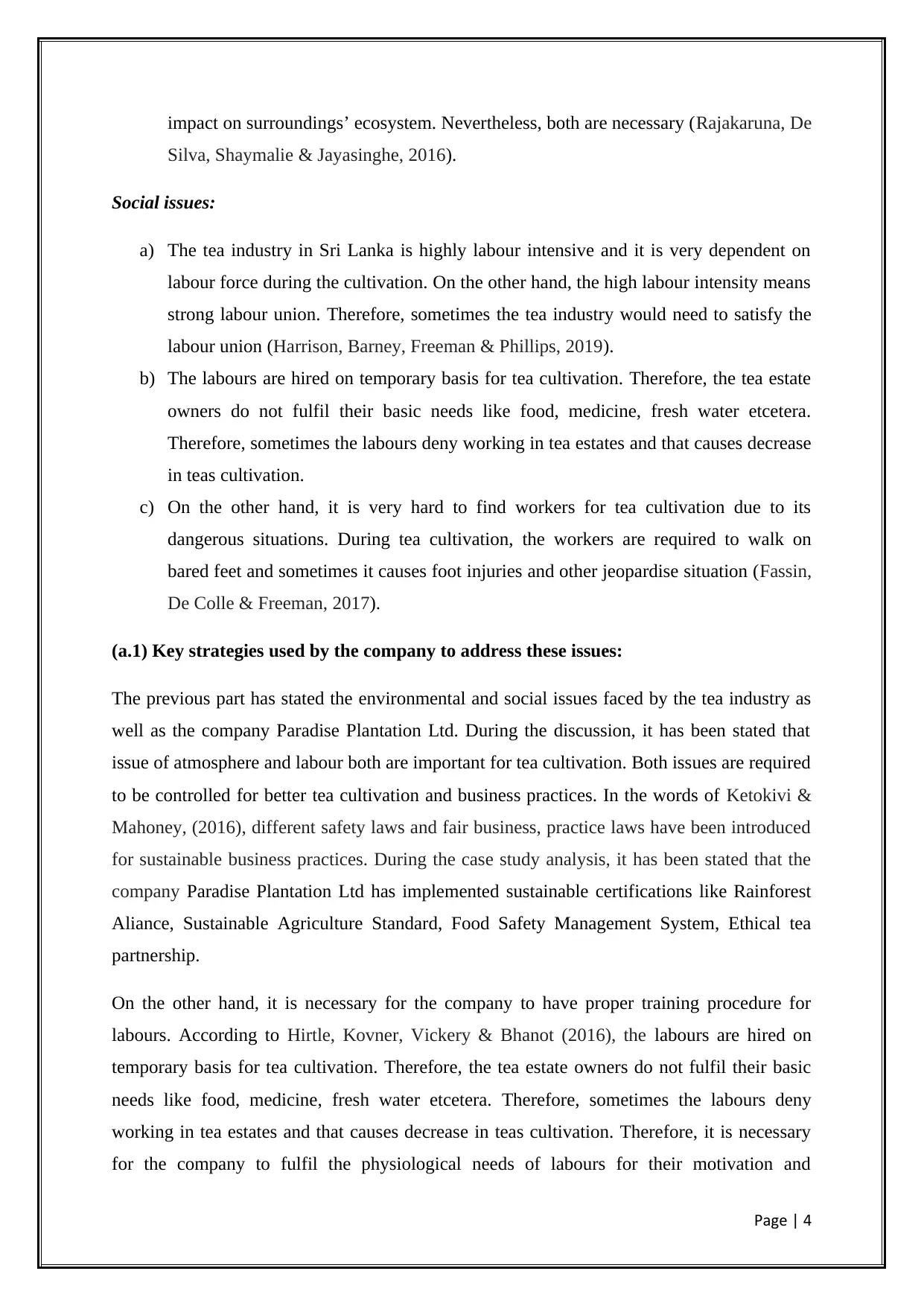
impact on surroundings’ ecosystem. Nevertheless, both are necessary (Rajakaruna, De
Silva, Shaymalie & Jayasinghe, 2016).
Social issues:
a) The tea industry in Sri Lanka is highly labour intensive and it is very dependent on
labour force during the cultivation. On the other hand, the high labour intensity means
strong labour union. Therefore, sometimes the tea industry would need to satisfy the
labour union (Harrison, Barney, Freeman & Phillips, 2019).
b) The labours are hired on temporary basis for tea cultivation. Therefore, the tea estate
owners do not fulfil their basic needs like food, medicine, fresh water etcetera.
Therefore, sometimes the labours deny working in tea estates and that causes decrease
in teas cultivation.
c) On the other hand, it is very hard to find workers for tea cultivation due to its
dangerous situations. During tea cultivation, the workers are required to walk on
bared feet and sometimes it causes foot injuries and other jeopardise situation (Fassin,
De Colle & Freeman, 2017).
(a.1) Key strategies used by the company to address these issues:
The previous part has stated the environmental and social issues faced by the tea industry as
well as the company Paradise Plantation Ltd. During the discussion, it has been stated that
issue of atmosphere and labour both are important for tea cultivation. Both issues are required
to be controlled for better tea cultivation and business practices. In the words of Ketokivi &
Mahoney, (2016), different safety laws and fair business, practice laws have been introduced
for sustainable business practices. During the case study analysis, it has been stated that the
company Paradise Plantation Ltd has implemented sustainable certifications like Rainforest
Aliance, Sustainable Agriculture Standard, Food Safety Management System, Ethical tea
partnership.
On the other hand, it is necessary for the company to have proper training procedure for
labours. According to Hirtle, Kovner, Vickery & Bhanot (2016), the labours are hired on
temporary basis for tea cultivation. Therefore, the tea estate owners do not fulfil their basic
needs like food, medicine, fresh water etcetera. Therefore, sometimes the labours deny
working in tea estates and that causes decrease in teas cultivation. Therefore, it is necessary
for the company to fulfil the physiological needs of labours for their motivation and
Page | 4
Silva, Shaymalie & Jayasinghe, 2016).
Social issues:
a) The tea industry in Sri Lanka is highly labour intensive and it is very dependent on
labour force during the cultivation. On the other hand, the high labour intensity means
strong labour union. Therefore, sometimes the tea industry would need to satisfy the
labour union (Harrison, Barney, Freeman & Phillips, 2019).
b) The labours are hired on temporary basis for tea cultivation. Therefore, the tea estate
owners do not fulfil their basic needs like food, medicine, fresh water etcetera.
Therefore, sometimes the labours deny working in tea estates and that causes decrease
in teas cultivation.
c) On the other hand, it is very hard to find workers for tea cultivation due to its
dangerous situations. During tea cultivation, the workers are required to walk on
bared feet and sometimes it causes foot injuries and other jeopardise situation (Fassin,
De Colle & Freeman, 2017).
(a.1) Key strategies used by the company to address these issues:
The previous part has stated the environmental and social issues faced by the tea industry as
well as the company Paradise Plantation Ltd. During the discussion, it has been stated that
issue of atmosphere and labour both are important for tea cultivation. Both issues are required
to be controlled for better tea cultivation and business practices. In the words of Ketokivi &
Mahoney, (2016), different safety laws and fair business, practice laws have been introduced
for sustainable business practices. During the case study analysis, it has been stated that the
company Paradise Plantation Ltd has implemented sustainable certifications like Rainforest
Aliance, Sustainable Agriculture Standard, Food Safety Management System, Ethical tea
partnership.
On the other hand, it is necessary for the company to have proper training procedure for
labours. According to Hirtle, Kovner, Vickery & Bhanot (2016), the labours are hired on
temporary basis for tea cultivation. Therefore, the tea estate owners do not fulfil their basic
needs like food, medicine, fresh water etcetera. Therefore, sometimes the labours deny
working in tea estates and that causes decrease in teas cultivation. Therefore, it is necessary
for the company to fulfil the physiological needs of labours for their motivation and
Page | 4
Paraphrase This Document
Need a fresh take? Get an instant paraphrase of this document with our AI Paraphraser

workforce development. On the other hand, workplace safety procedures would need to be
implemented for the labours and need to have proper medication facility (Serenko, 2019).
(b) Explaining the impact of socio-political and economical issues on company’s
management:
During the discussion of this study, the researcher has critically discussed the environmental
and social issues faced by tea industry as well as the company. Several atmospheric
challenges and social challenges have been discussed in previous part, which have great
impact on company’s management practices. The social issues are related to labour force,
which are very important for tea cultivation. In the words of Smith & Tracey (2016), as per
the Maslow’s hierarchy need theory, the primary need of individual is physiological needs,
which are partially fulfilled in tea industry. Therefore, it is essential for all tea companies to
fulfil labours’ physiological needs for better labour force. On the other hand, the socio-
political and economical issues are interrelated to each other. The impacts of issues on
company’s management are stated below:
Not fulfilling the physiological needs of labours would influence tea cultivation
process, because the labours would not be ready to work in tea estates. Along with
this, the labour union might create problem for not fulfilling needs of labours. This is
how the socio-political issues might influence company’s management (Cardinale,
2018).
Less tea production will reduce the export of tealeaves and that would affect the
company and national economy as well.
Along with this, economically down would lead to have unemployment and that
would enlarge the economic gap in national level (Ketokivi & Mahoney, 2016).
The stakeholders are related with socio-political factors, because stakeholders are
involved in company’s decision-making process.
(c) Ethical and managerial branches of stakeholder theory:
Stakeholder theory is related to organisation and business ethics or moral values. Along with
this, the stakeholder theory is related to organisational ethics, corporate social
responsibilities, stakeholders’ values and moral values, economy of market etcetera. In the
words of Palihakkara & Inoue (2018), stakeholder theory sets an interconnection between
company and customer, supplier, workers, managers, investors or other business partners. On
Page | 5
implemented for the labours and need to have proper medication facility (Serenko, 2019).
(b) Explaining the impact of socio-political and economical issues on company’s
management:
During the discussion of this study, the researcher has critically discussed the environmental
and social issues faced by tea industry as well as the company. Several atmospheric
challenges and social challenges have been discussed in previous part, which have great
impact on company’s management practices. The social issues are related to labour force,
which are very important for tea cultivation. In the words of Smith & Tracey (2016), as per
the Maslow’s hierarchy need theory, the primary need of individual is physiological needs,
which are partially fulfilled in tea industry. Therefore, it is essential for all tea companies to
fulfil labours’ physiological needs for better labour force. On the other hand, the socio-
political and economical issues are interrelated to each other. The impacts of issues on
company’s management are stated below:
Not fulfilling the physiological needs of labours would influence tea cultivation
process, because the labours would not be ready to work in tea estates. Along with
this, the labour union might create problem for not fulfilling needs of labours. This is
how the socio-political issues might influence company’s management (Cardinale,
2018).
Less tea production will reduce the export of tealeaves and that would affect the
company and national economy as well.
Along with this, economically down would lead to have unemployment and that
would enlarge the economic gap in national level (Ketokivi & Mahoney, 2016).
The stakeholders are related with socio-political factors, because stakeholders are
involved in company’s decision-making process.
(c) Ethical and managerial branches of stakeholder theory:
Stakeholder theory is related to organisation and business ethics or moral values. Along with
this, the stakeholder theory is related to organisational ethics, corporate social
responsibilities, stakeholders’ values and moral values, economy of market etcetera. In the
words of Palihakkara & Inoue (2018), stakeholder theory sets an interconnection between
company and customer, supplier, workers, managers, investors or other business partners. On
Page | 5
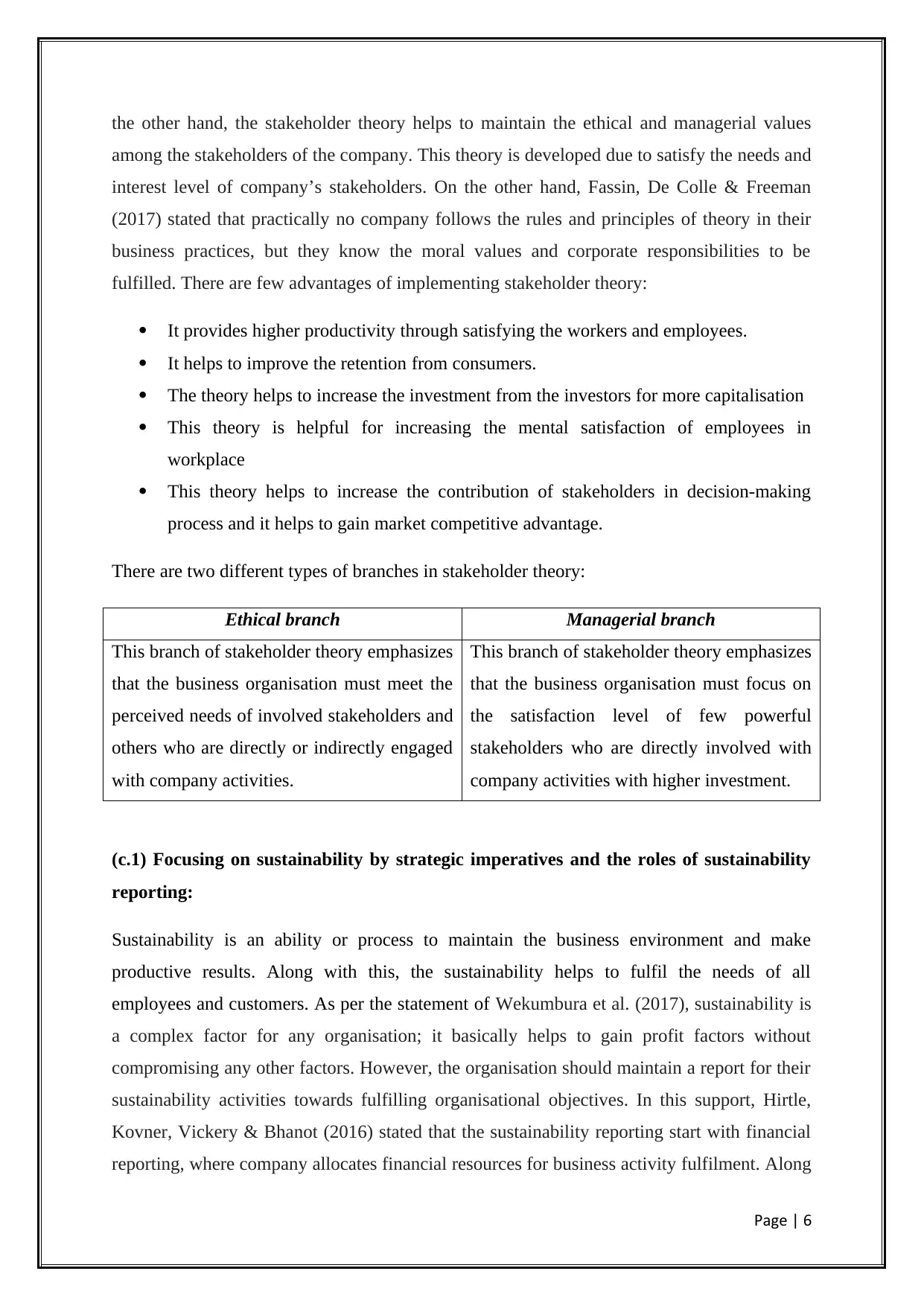
the other hand, the stakeholder theory helps to maintain the ethical and managerial values
among the stakeholders of the company. This theory is developed due to satisfy the needs and
interest level of company’s stakeholders. On the other hand, Fassin, De Colle & Freeman
(2017) stated that practically no company follows the rules and principles of theory in their
business practices, but they know the moral values and corporate responsibilities to be
fulfilled. There are few advantages of implementing stakeholder theory:
It provides higher productivity through satisfying the workers and employees.
It helps to improve the retention from consumers.
The theory helps to increase the investment from the investors for more capitalisation
This theory is helpful for increasing the mental satisfaction of employees in
workplace
This theory helps to increase the contribution of stakeholders in decision-making
process and it helps to gain market competitive advantage.
There are two different types of branches in stakeholder theory:
Ethical branch Managerial branch
This branch of stakeholder theory emphasizes
that the business organisation must meet the
perceived needs of involved stakeholders and
others who are directly or indirectly engaged
with company activities.
This branch of stakeholder theory emphasizes
that the business organisation must focus on
the satisfaction level of few powerful
stakeholders who are directly involved with
company activities with higher investment.
(c.1) Focusing on sustainability by strategic imperatives and the roles of sustainability
reporting:
Sustainability is an ability or process to maintain the business environment and make
productive results. Along with this, the sustainability helps to fulfil the needs of all
employees and customers. As per the statement of Wekumbura et al. (2017), sustainability is
a complex factor for any organisation; it basically helps to gain profit factors without
compromising any other factors. However, the organisation should maintain a report for their
sustainability activities towards fulfilling organisational objectives. In this support, Hirtle,
Kovner, Vickery & Bhanot (2016) stated that the sustainability reporting start with financial
reporting, where company allocates financial resources for business activity fulfilment. Along
Page | 6
among the stakeholders of the company. This theory is developed due to satisfy the needs and
interest level of company’s stakeholders. On the other hand, Fassin, De Colle & Freeman
(2017) stated that practically no company follows the rules and principles of theory in their
business practices, but they know the moral values and corporate responsibilities to be
fulfilled. There are few advantages of implementing stakeholder theory:
It provides higher productivity through satisfying the workers and employees.
It helps to improve the retention from consumers.
The theory helps to increase the investment from the investors for more capitalisation
This theory is helpful for increasing the mental satisfaction of employees in
workplace
This theory helps to increase the contribution of stakeholders in decision-making
process and it helps to gain market competitive advantage.
There are two different types of branches in stakeholder theory:
Ethical branch Managerial branch
This branch of stakeholder theory emphasizes
that the business organisation must meet the
perceived needs of involved stakeholders and
others who are directly or indirectly engaged
with company activities.
This branch of stakeholder theory emphasizes
that the business organisation must focus on
the satisfaction level of few powerful
stakeholders who are directly involved with
company activities with higher investment.
(c.1) Focusing on sustainability by strategic imperatives and the roles of sustainability
reporting:
Sustainability is an ability or process to maintain the business environment and make
productive results. Along with this, the sustainability helps to fulfil the needs of all
employees and customers. As per the statement of Wekumbura et al. (2017), sustainability is
a complex factor for any organisation; it basically helps to gain profit factors without
compromising any other factors. However, the organisation should maintain a report for their
sustainability activities towards fulfilling organisational objectives. In this support, Hirtle,
Kovner, Vickery & Bhanot (2016) stated that the sustainability reporting start with financial
reporting, where company allocates financial resources for business activity fulfilment. Along
Page | 6
⊘ This is a preview!⊘
Do you want full access?
Subscribe today to unlock all pages.

Trusted by 1+ million students worldwide
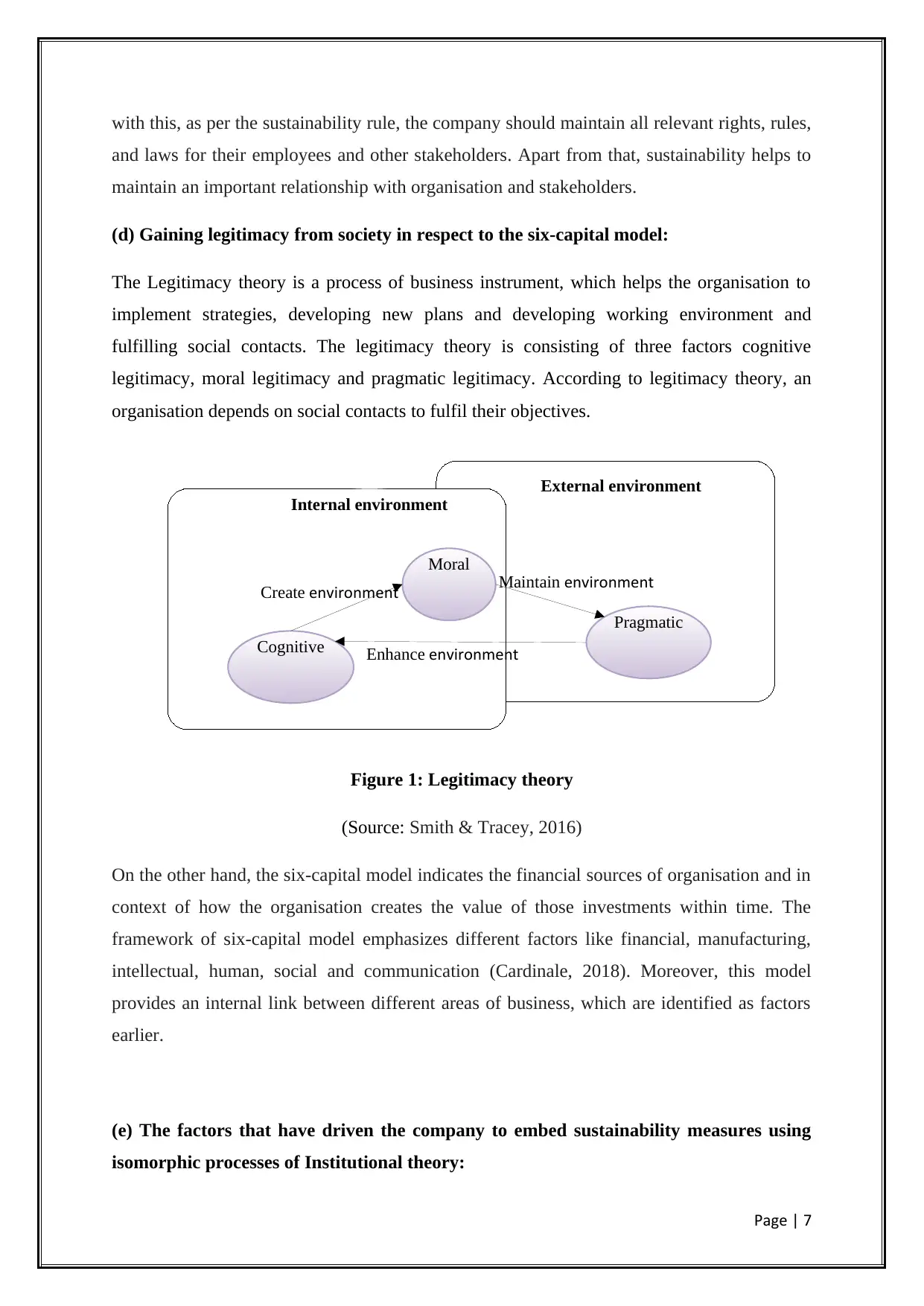
Internal environment
Moral
Cognitive
Pragmatic
Create environment
Enhance environment
Maintain environment
External environment
with this, as per the sustainability rule, the company should maintain all relevant rights, rules,
and laws for their employees and other stakeholders. Apart from that, sustainability helps to
maintain an important relationship with organisation and stakeholders.
(d) Gaining legitimacy from society in respect to the six-capital model:
The Legitimacy theory is a process of business instrument, which helps the organisation to
implement strategies, developing new plans and developing working environment and
fulfilling social contacts. The legitimacy theory is consisting of three factors cognitive
legitimacy, moral legitimacy and pragmatic legitimacy. According to legitimacy theory, an
organisation depends on social contacts to fulfil their objectives.
Figure 1: Legitimacy theory
(Source: Smith & Tracey, 2016)
On the other hand, the six-capital model indicates the financial sources of organisation and in
context of how the organisation creates the value of those investments within time. The
framework of six-capital model emphasizes different factors like financial, manufacturing,
intellectual, human, social and communication (Cardinale, 2018). Moreover, this model
provides an internal link between different areas of business, which are identified as factors
earlier.
(e) The factors that have driven the company to embed sustainability measures using
isomorphic processes of Institutional theory:
Page | 7
Moral
Cognitive
Pragmatic
Create environment
Enhance environment
Maintain environment
External environment
with this, as per the sustainability rule, the company should maintain all relevant rights, rules,
and laws for their employees and other stakeholders. Apart from that, sustainability helps to
maintain an important relationship with organisation and stakeholders.
(d) Gaining legitimacy from society in respect to the six-capital model:
The Legitimacy theory is a process of business instrument, which helps the organisation to
implement strategies, developing new plans and developing working environment and
fulfilling social contacts. The legitimacy theory is consisting of three factors cognitive
legitimacy, moral legitimacy and pragmatic legitimacy. According to legitimacy theory, an
organisation depends on social contacts to fulfil their objectives.
Figure 1: Legitimacy theory
(Source: Smith & Tracey, 2016)
On the other hand, the six-capital model indicates the financial sources of organisation and in
context of how the organisation creates the value of those investments within time. The
framework of six-capital model emphasizes different factors like financial, manufacturing,
intellectual, human, social and communication (Cardinale, 2018). Moreover, this model
provides an internal link between different areas of business, which are identified as factors
earlier.
(e) The factors that have driven the company to embed sustainability measures using
isomorphic processes of Institutional theory:
Page | 7
Paraphrase This Document
Need a fresh take? Get an instant paraphrase of this document with our AI Paraphraser
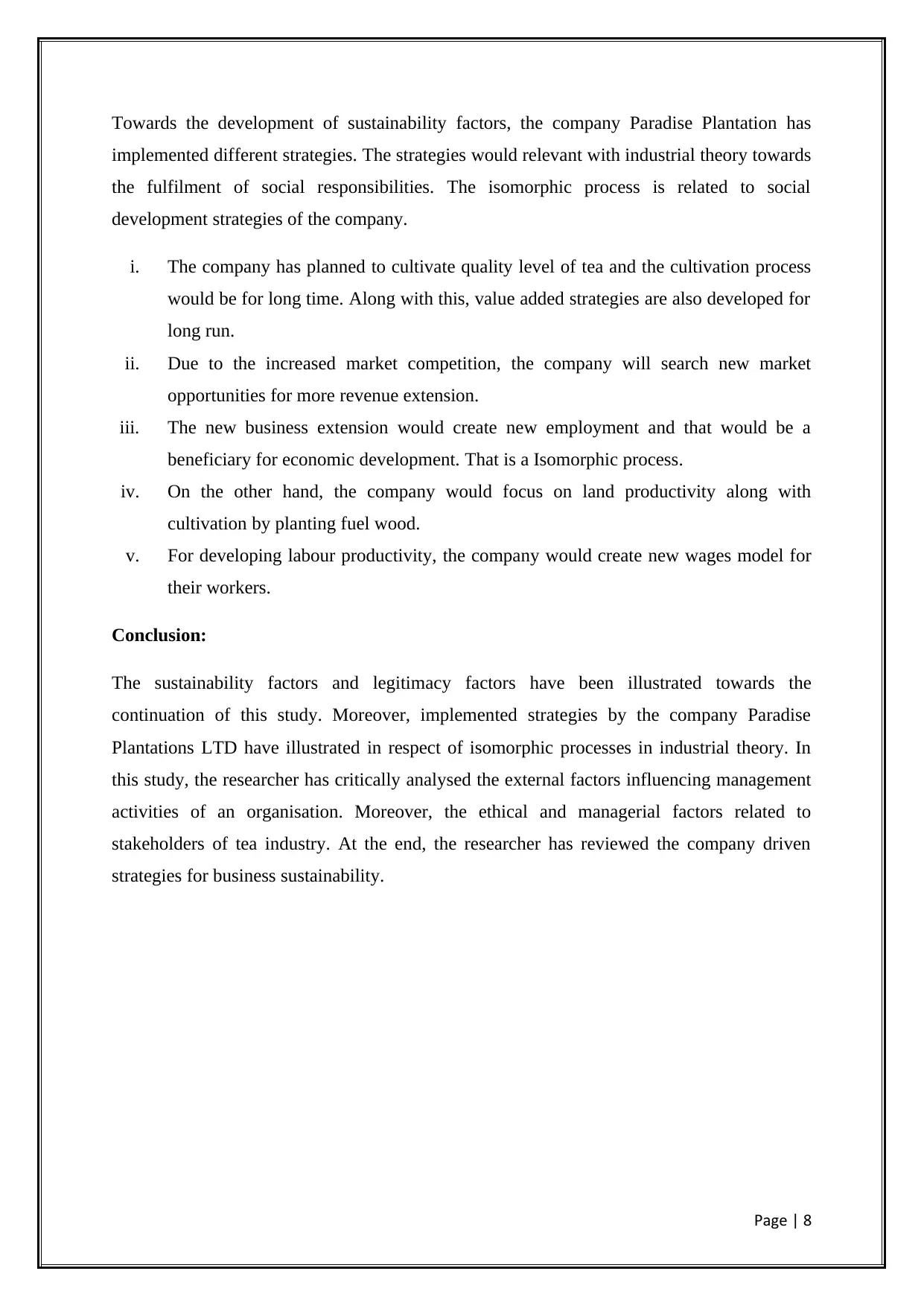
Towards the development of sustainability factors, the company Paradise Plantation has
implemented different strategies. The strategies would relevant with industrial theory towards
the fulfilment of social responsibilities. The isomorphic process is related to social
development strategies of the company.
i. The company has planned to cultivate quality level of tea and the cultivation process
would be for long time. Along with this, value added strategies are also developed for
long run.
ii. Due to the increased market competition, the company will search new market
opportunities for more revenue extension.
iii. The new business extension would create new employment and that would be a
beneficiary for economic development. That is a Isomorphic process.
iv. On the other hand, the company would focus on land productivity along with
cultivation by planting fuel wood.
v. For developing labour productivity, the company would create new wages model for
their workers.
Conclusion:
The sustainability factors and legitimacy factors have been illustrated towards the
continuation of this study. Moreover, implemented strategies by the company Paradise
Plantations LTD have illustrated in respect of isomorphic processes in industrial theory. In
this study, the researcher has critically analysed the external factors influencing management
activities of an organisation. Moreover, the ethical and managerial factors related to
stakeholders of tea industry. At the end, the researcher has reviewed the company driven
strategies for business sustainability.
Page | 8
implemented different strategies. The strategies would relevant with industrial theory towards
the fulfilment of social responsibilities. The isomorphic process is related to social
development strategies of the company.
i. The company has planned to cultivate quality level of tea and the cultivation process
would be for long time. Along with this, value added strategies are also developed for
long run.
ii. Due to the increased market competition, the company will search new market
opportunities for more revenue extension.
iii. The new business extension would create new employment and that would be a
beneficiary for economic development. That is a Isomorphic process.
iv. On the other hand, the company would focus on land productivity along with
cultivation by planting fuel wood.
v. For developing labour productivity, the company would create new wages model for
their workers.
Conclusion:
The sustainability factors and legitimacy factors have been illustrated towards the
continuation of this study. Moreover, implemented strategies by the company Paradise
Plantations LTD have illustrated in respect of isomorphic processes in industrial theory. In
this study, the researcher has critically analysed the external factors influencing management
activities of an organisation. Moreover, the ethical and managerial factors related to
stakeholders of tea industry. At the end, the researcher has reviewed the company driven
strategies for business sustainability.
Page | 8
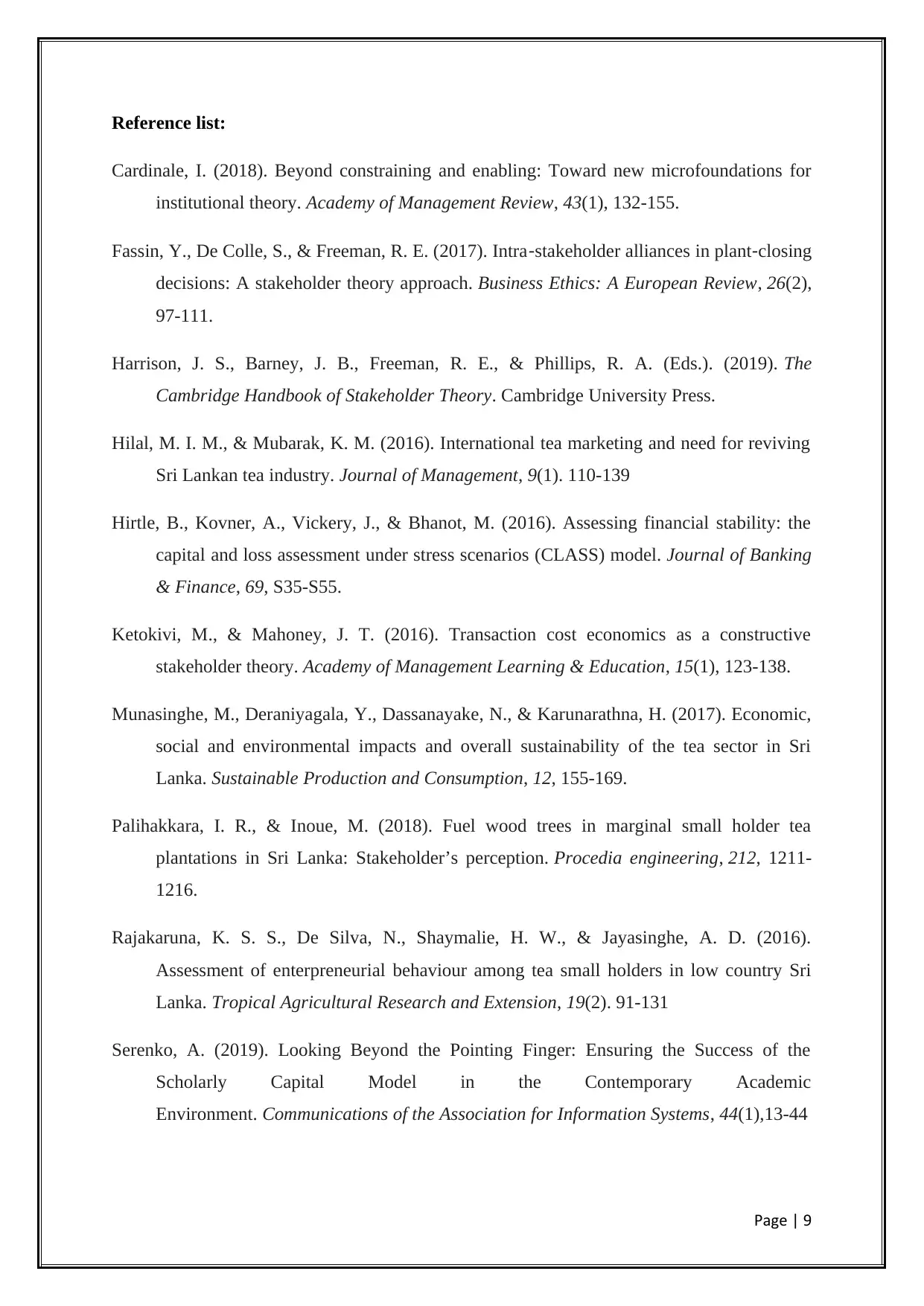
Reference list:
Cardinale, I. (2018). Beyond constraining and enabling: Toward new microfoundations for
institutional theory. Academy of Management Review, 43(1), 132-155.
Fassin, Y., De Colle, S., & Freeman, R. E. (2017). Intra‐stakeholder alliances in plant‐closing
decisions: A stakeholder theory approach. Business Ethics: A European Review, 26(2),
97-111.
Harrison, J. S., Barney, J. B., Freeman, R. E., & Phillips, R. A. (Eds.). (2019). The
Cambridge Handbook of Stakeholder Theory. Cambridge University Press.
Hilal, M. I. M., & Mubarak, K. M. (2016). International tea marketing and need for reviving
Sri Lankan tea industry. Journal of Management, 9(1). 110-139
Hirtle, B., Kovner, A., Vickery, J., & Bhanot, M. (2016). Assessing financial stability: the
capital and loss assessment under stress scenarios (CLASS) model. Journal of Banking
& Finance, 69, S35-S55.
Ketokivi, M., & Mahoney, J. T. (2016). Transaction cost economics as a constructive
stakeholder theory. Academy of Management Learning & Education, 15(1), 123-138.
Munasinghe, M., Deraniyagala, Y., Dassanayake, N., & Karunarathna, H. (2017). Economic,
social and environmental impacts and overall sustainability of the tea sector in Sri
Lanka. Sustainable Production and Consumption, 12, 155-169.
Palihakkara, I. R., & Inoue, M. (2018). Fuel wood trees in marginal small holder tea
plantations in Sri Lanka: Stakeholder’s perception. Procedia engineering, 212, 1211-
1216.
Rajakaruna, K. S. S., De Silva, N., Shaymalie, H. W., & Jayasinghe, A. D. (2016).
Assessment of enterpreneurial behaviour among tea small holders in low country Sri
Lanka. Tropical Agricultural Research and Extension, 19(2). 91-131
Serenko, A. (2019). Looking Beyond the Pointing Finger: Ensuring the Success of the
Scholarly Capital Model in the Contemporary Academic
Environment. Communications of the Association for Information Systems, 44(1),13-44
Page | 9
Cardinale, I. (2018). Beyond constraining and enabling: Toward new microfoundations for
institutional theory. Academy of Management Review, 43(1), 132-155.
Fassin, Y., De Colle, S., & Freeman, R. E. (2017). Intra‐stakeholder alliances in plant‐closing
decisions: A stakeholder theory approach. Business Ethics: A European Review, 26(2),
97-111.
Harrison, J. S., Barney, J. B., Freeman, R. E., & Phillips, R. A. (Eds.). (2019). The
Cambridge Handbook of Stakeholder Theory. Cambridge University Press.
Hilal, M. I. M., & Mubarak, K. M. (2016). International tea marketing and need for reviving
Sri Lankan tea industry. Journal of Management, 9(1). 110-139
Hirtle, B., Kovner, A., Vickery, J., & Bhanot, M. (2016). Assessing financial stability: the
capital and loss assessment under stress scenarios (CLASS) model. Journal of Banking
& Finance, 69, S35-S55.
Ketokivi, M., & Mahoney, J. T. (2016). Transaction cost economics as a constructive
stakeholder theory. Academy of Management Learning & Education, 15(1), 123-138.
Munasinghe, M., Deraniyagala, Y., Dassanayake, N., & Karunarathna, H. (2017). Economic,
social and environmental impacts and overall sustainability of the tea sector in Sri
Lanka. Sustainable Production and Consumption, 12, 155-169.
Palihakkara, I. R., & Inoue, M. (2018). Fuel wood trees in marginal small holder tea
plantations in Sri Lanka: Stakeholder’s perception. Procedia engineering, 212, 1211-
1216.
Rajakaruna, K. S. S., De Silva, N., Shaymalie, H. W., & Jayasinghe, A. D. (2016).
Assessment of enterpreneurial behaviour among tea small holders in low country Sri
Lanka. Tropical Agricultural Research and Extension, 19(2). 91-131
Serenko, A. (2019). Looking Beyond the Pointing Finger: Ensuring the Success of the
Scholarly Capital Model in the Contemporary Academic
Environment. Communications of the Association for Information Systems, 44(1),13-44
Page | 9
⊘ This is a preview!⊘
Do you want full access?
Subscribe today to unlock all pages.

Trusted by 1+ million students worldwide

Smith, W. K., & Tracey, P. (2016). Institutional complexity and paradox theory:
Complementarities of competing demands. Strategic Organization, 14(4), 455-466.
Wekumbura, W. G. C., Mohotti, A. J., Frossard, E., Kudagammana, S. T., & Silva, K. D. R.
R. (2017). Prospects and issues related to tea cultivation in mid country homegarden
based tea smallholdings in a selected village in Sri Lanka. Tropical Agricultural
Research, 28(4), 503-516.
Page | 10
Complementarities of competing demands. Strategic Organization, 14(4), 455-466.
Wekumbura, W. G. C., Mohotti, A. J., Frossard, E., Kudagammana, S. T., & Silva, K. D. R.
R. (2017). Prospects and issues related to tea cultivation in mid country homegarden
based tea smallholdings in a selected village in Sri Lanka. Tropical Agricultural
Research, 28(4), 503-516.
Page | 10
1 out of 10
Related Documents
Your All-in-One AI-Powered Toolkit for Academic Success.
+13062052269
info@desklib.com
Available 24*7 on WhatsApp / Email
![[object Object]](/_next/static/media/star-bottom.7253800d.svg)
Unlock your academic potential
Copyright © 2020–2026 A2Z Services. All Rights Reserved. Developed and managed by ZUCOL.





